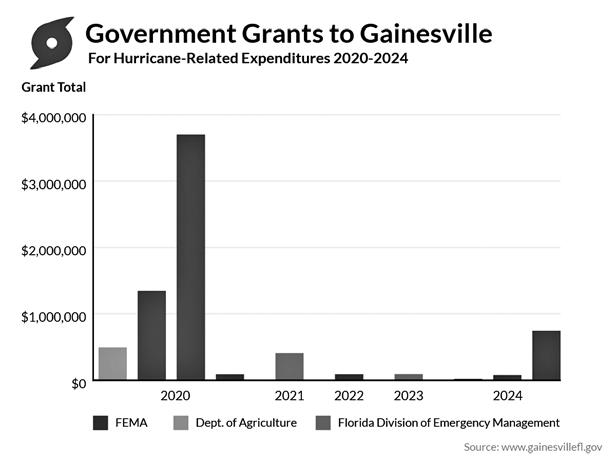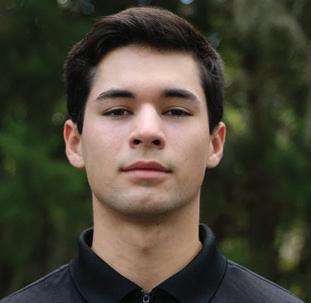




By Maria Arruda Alligator Staff Writer
A year after being hit with two hurricanes back-to-back, Gainesville and Alachua County have not received reimbursements from the Federal Emergency Management Agency. After recent federal changes, the future of the funds is unclear.
The Trump administration canceled billions of dollars in FEMA disaster payments Sept. 15, according to a government report, and it has expressed interest in disbanding the agency altogether. In January, President Trump signed an executive order creating a council to assess FEMA to propose structural reforms.
“We want to wean off of FEMA, and we want to bring it down to the state level,” Trump said, per CNN. “A governor should be able to handle it, and frankly, if they can’t handle it, the aftermath, then maybe they shouldn’t be governor.”
Hurricanes Helene and Milton hit Florida’s Gulf Coast in 2024 as Category 4 and 3 hurricanes, respectively. The two hurricanes caused 289 deaths across multiple states, according to reports by the National Oceanic and Atmospheric Administration.
Gainesville and Alachua County suffered varied infrastructure damage.
Almost 40% of Gainesville lost power during Hurricane Helene, according to previous Alligator reporting, and fallen trees damaged power lines and blocked over 50 roadways across the city.
Alachua County lost almost 170 traffic lights during the storm, but no major injuries were reported. The county was set to receive $6.5 million in FEMA reimbursement for the damages, according to Tommy Crosby, assistant county manager for budget and fiscal services.
Prepared for the worst
The Alachua emergency reserve was originally established on general fund dollars, Crosby said. That means the money came from local taxpayers, not federal or state disaster programs. Now, the county is waiting on its FEMA reimbursement to replenish the reserve.
Financial documents indicate the county reported about $21 million in revenue but $22.3 million in expenses for its 2024-25 fiscal year emergency services fund.
Jennifer Grice, Alachua County’s emergency management director, said the county is adding to its monetary reserve in case it has to take over FEMA’s financial responsibility.
Direct effects of the federal changes have not necessarily hit yet, she said, as reforms will only be implemented after this hurricane season, but the county’s priorities will always be residents’ life, safety and protection.
“I would want the public to know that our mission doesn’t change,” she said.
Alachua County receives the Emergency Management Performance Grant, a preparedness fund given by FEMA every year, Grice said. Regarding the grant’s future, Grice said she did not want to speculate on what the government will do, and it’s unclear whether the grant will be renewed.
The county’s additional emergency funding comes from its general fund and the state’s Emergency Management Preparedness and Assistance program, or EMPA — a yearly grant distributed to Florida counties.
Grice’s current focus is community outreach. Alachua County has ramped up efforts to educate residents about emergency preparedness, ensuring they are better able to weather the next storm.
“It is more essential than ever that our residents get as prepared as they possibly can with the means that they have,” she said.
That includes cooperating with the local Community Organizations Active in Disaster group, or COAD.
COAD members assist with tasks the government can’t do, including cleaning private properties. The emergency management office is helping ensure the group has enough members to meet Alachua’s needs, Grice said.
She added FEMA may also transfer disaster recovery center responsibilities to local governments. Disaster recovery centers assist residents with housing resources and FEMA applications after natural disasters.
Grice said the county is searching for local agencies, locations and equipment it may need to “pull this off” if it becomes the county’s responsibility.
An uncertain future
Interim Emergency Manager Alvin Jones said Gainesville has not received the Federal Emergency Management Agency reimbursement for last year’s hurricanes, though he added it’s not unusual for reimbursements to take some time to disperse, especially if the storm caused widespread impact.
North Carolina took the brunt of Helene’s storm, claiming nearly half of the hurricane’s victims. The Carolina Public Press reported last November damages from Helene would cost more than $53 billion. Milton’s damage was centered in Florida’s Gulf Coast in cities such as Sarasota, costing Sarasota County around $440 million.
“You have to imagine it’s not just our area that’s affected,” Jones said.
Emergency funds are typically used in accordance with a city’s needs, he said, and county-wide spending summaries are sent to the state, and then to FEMA, after disasters. Though Gainesville and Alachua emergency departments work separately, Jones said, FEMA reimbursements are on a county-bycounty basis.
Jones declined to comment on how the federal FEMA changes may impact Gainesville’s emergency budget.
Gainesville Mayor Harvey Ward said the city does not have a set budget for natural disasters, but levels of financial preparedness are “baked into” the budgets of all the city’s departments.
The city holds a cash reserve with 25% of Gainesville’s general fund for emergency situations. In the past, Gainesville counted on the FEMA reimbursements to maintain its disaster funding, Ward said.
The city has always followed necessary FEMA protocols, Ward said, and after Milton and Helene, it hired consultants to follow clean-up teams and ensure all their work was fully refundable.
The recent federal changes mean FEMA now provides reimbursements based on immediate need. Immediate Needs Funding status is only enacted when disaster relief costs more than what’s available, and FEMA is needed to provide “lifesaving, life-sustaining” operations.
Since 2001, FEMA has only entered nationwide immediate-need status 10 times. Though the agency has not entered that status this year, it is prioritizing immediate need over other operations, such as recovery activities from previous emergencies.
Ward said the city can no longer expect FEMA’s assistance when it comes to natural disasters, and the national funding cuts will hurt a lot of cities. He added Gainesville will continue to follow its procedure of maintaining a 25% disaster relief fund regardless of FEMA’s future.
“Let’s all keep our fingers crossed that the federal government gets right, and builds or rebuilds … a system that will be a backstop for cities and counties, and local governments of all sorts, when, not if, when natural disasters occur,” Ward said.
By Sofia Bravo Alligator Staff Writer
Alachua County’s hunger-relief network is being forced into a test it hasn’t faced in years: whether community charities can absorb the fallout of shrinking federal support.
Nearly 10,000 households in Alachua County receive Supplemental Nutrition Assistance Program benefits as of 2023, of which a little over one-third have children, according to the U.S. Census Bureau’s American Community Survey. Those recipients have been at risk of losing critical food aid since Nov. 1, when funding for SNAP lapsed amid the longest federal government shutdown in U.S. history.
The government said it would send states money on Nov. 7 to fully fund SNAP. But later that night, the U.S. Supreme Court temporarily granted the Trump administration’s request to block full benefits, giving the court of appeals time to weigh in on the matter.
SNAP, formerly known as food stamps, is the largest anti-hunger program in the U.S. In Florida, nearly one in eight people rely on its benefits.
Food banks overwhelmed
With SNAP benefits being cut, some will have to make the difficult decisions between paying rent, buying groceries or filling their kids’ prescriptions, said Patrick Dodds, the executive director of Bread of the Mighty Food Bank.
The North Central Florida-based bank heavily relies on donations to provide for families and works with around 150 partner agencies to deliver food to families in need.
Since the cuts, those agencies told him they’re seeing double the amount of people they normally serve, making food distribution more difficult.
Dodds has already seen the impacts on families.
“You’ve got a lot of people right now that are feeling hopeless,” he said. “They don’t know how they’re going to feed their families.”
Soon after the cuts were announced, the Alachua County Commission agreed to support the food bank with $100,000, and two days later, the Gainesville City Commission matched that donation.
But Dodds said the funding will only last so long. SNAP recipients won’t see funds in their accounts for at least a week, he said.
“A week without that funding is catastrophic,” he said.
With the holiday season already being a busy time at food pantries, the addition of SNAP cuts will likely overwhelm them, said Laurie Porter,
the development director at community service organization Catholic Charities Gainesville. She said she’s begun to see a ripple effect of the SNAP program within the past two weeks, serving about 350 people on Nov. 4.
“Everybody who is coming in is worried,” Porter said. “Everybody who is coming in is in some sort of a crisis.”
Gainesville has high rents and utilities, but some of the lowest paying jobs, she said. Nearly two-thirds of Gainesville renters were cost-burdened, meaning they gave at least 30% of their annual income to housing costs, in 2023.
As a result, there’s always people who are going to need food assistance services in the city, she said.
“Even when they were getting SNAP, they were still struggling,” she said. “It’s now they’re just struggling even more.”
The impact has been almost immediate, said Jorge Peraza, development director at Brother’s Keeper. The Ocala-based social service outreach provides emergency services, rental assistance and a soup kitchen.
Peraza said there are an unprecedented amount of new faces coming into the pantry needing assistance. He worries because the food banks and agencies he works with can’t manage everything on their own.
While Peraza is relieved people are looking for the help they need, the pantry can’t sustain everyone who needs it.
“Everybody’s struggling,” he said.
A community stepping up
One Gainesville resident recognized the stress on food banks even before the SNAP cuts took effect.
Melissa Jackson created her own community food bank right on the corner of 16th Avenue and Second Street, just six minutes away from UF.
After seeing the need for food assistance in her local community roughly three months ago, Jackson spearheaded the pop-up pantry with her wife.
Within the past week, she has noticed more donations. She’s taken to Facebook to “blast” the location of the box for people in need to visit. In any given week, she typically receives about two donations. Since the SNAP cuts were announced, she received five donations in a single week from people bringing in anything they could.
Jackson said the community has expressed gratitude for the plethora of food, which is inclusive to meat-eaters and vegans alike.
“The food banks do the bulk of the work,” she said. “But these small efforts help.”
@sofiab026 sbravo@alligator.org

By Maria Arruda Alligator Staff Writer
Following the federal slashing of funds toward public media, WUFT — Gainesville’s local NPR and PBS station, housed at UF — is looking for ways to fill its funding gap.
In July, the Trump administration cut $1.1 billion from the Corporation for Public Broadcasting, which funds nationwide public TV and radio stations.
Immediately following the announcement, Hub Brown, dean of UF’s College of Journalism and Communications, said in an email to the college the national cuts would rescind $1.2 million annually from WUFT’s TV and radio stations.
WUFT, UF’s student-driven local news outlet, is primarily funded by donors, corporate sponsors, UF, the Corporation of Public Broadcasting and the state. Since the cuts, Brown said, the college has relied on a previously built reserve to sustain it through the 2026 fiscal year until a long-term solution is found.
“I'm optimistic that we're going to be able to get through this,” he said.
Brown said WUFT is “certainly not” relying on state assistance to resolve the issue. Gov. Ron DeSantis’ line-item veto prevents the college from relying on the state to fill in national funding gaps, he said.
DeSantis denied nearly $6 million to Florida’s public broadcasting outlets for the 20252026 fiscal year. The Florida Public Radio Emergency Network, a public safety initiative housed at WUFT, was spared from the funding vetoes.
The governor cut about $370,000 from each public TV station and $100,000 from each public radio station. All together, WUFT also lost around $470,000 because of the loss in state support, Brown confirmed in a July email.
Instead of the state, he said, WUFT is working with UF central administration to replace funding. In particular, they hope to sustain staff who directly affect WUFT’s “educational mission.”
“If you're in broadcast journalism, it's quite likely one of your faculty members was some-
body who, is somebody who, was supported by some of that funding that we got,” he said.
UF employed 26 full-time WUFT public radio and TV employees, in addition to 13 people whose salaries came only partly from WUFT, last academic year, according to school-provided data. Altogether, their salaries totaled about $2.6 million.
UF’s leadership understands the value of WUFT, Brown added. The short-term goal is to ensure students do not feel the impact of the cuts. The long-term solution, though, is “still up for discussion.”
Randy Wright, the executive director of the division of media properties, said the station’s operational funds were reduced by around 20%.
No full-time positions have been cut, he said, but some part-time staff hours have been reduced. The station is focusing on increasing revenue by selling underwriting, which allows private businesses to provide support via donations.
Brown strongly advocated on behalf of the college to UF’s administration, and UF recognized WUFT’s uniqueness in providing “extraordinary experiences” to students, Wright said.
“WUFT and our staff play a significant role in what makes our college one of the national leaders in mass communication education,” Wright said.
Alicia Coleman, managing editor and associate chair of the Innovation News Center, said though the station lost over a million dollars, it’s “been pretty OK.”
Coleman has not seen any issues resulting from the cuts, she said, but staff has been asked to find ways to cut back — for example, by reducing some station-funded staff travel. She added even when the cuts happened, she was not worried.
“The work that we do kind of stands alone and is needed, and so I'm very optimistic that everything will kind of work out,” she said.
But, to some, the issue is deeper, and indicative of government censorship. Derek Bambauer, a UF law professor, said the admin-
SEE WUFT, PAGE 5


As Trump support dips among young conservatives,
THE ADMINISTRATION’S APPROVAL RATINGS HAVE DROPPED BUT REMAIN HIGH
By Shaine Davison Alligator Staff Writer
From February to August 2025, President Donald Trump’s approval among the young people who voted for him dropped by 23 percentage points.
But Craig Anderson wasn’t one of those who lost faith.
“Trump 2.0 is amazing,” he said. “This has been the most happy with Trump that
I've ever been.”
Anderson has long been involved in conservative politics. The 27-year-old Gainesville resident is a member of the Alachua Republican Party and the UF Turning Point USA chapter. He voted for Trump in the past three presidential elections and said he feels “fantastic” about the current administration.
Part of that support comes from the content he views on social media from conservative activists.
Political science experts say the rise of Republican influencers, many of whom connect with their audiences through podcasts,
SEE POLITICS, PAGE 5

It’s been just over a year since President Donald Trump was reelected, bringing massive changes not only to the White House, but also to local communities across the country. That includes UF, Gainesville and Alachua County.
Trump’s expansive agenda hoped to curtail immigration and increase deportations. The administration instructed immigration officers to patrol American cities and raid workplaces. Earlier this year, ICE detained several international university students over their political speech and temporarily revoked thousands of student statuses.
Trump’s foreign policy has centered around imposing heavy tariffs on U.S. allies and adversaries alike, meant to recenter manufacturing domestically. Those tariffs mean business owners pay higher fines to import products, while consumers absorb some of the costs in higher prices.
And, as of Oct. 1, Congress shut down the government, leaving millions of people without federal food stamp benefits and federal workers without paychecks. It’s the longest government shutdown in American history.
This edition of The Alligator looks at how things have changed here, on the ground. Federal funding cuts have hit local media and emergency management programs, while small businesses contend with the trickle-down effects of escalating tariffs. We spoke with international students worried about leaving the country under student visas. We heard from conservative and liberal community members about how politics make them feel — good and bad.
These stories reflect how the administration’s decisions have ripple effects in our community, even 776 miles from Washington.
By Alexa Ryan Alligator Staff Writer
A law initially passed to protect President Donald Trump during his visits to Florida is now being used to charge football fans with felonies.
The law was proposed after thousands of fans without tickets rushed into the stadium during the 2024 Copa America soccer tournament at Hard Rock Stadium in Miami. Lawmakers were also motivated over concerns for Trump’s safety while in Florida, particularly after an assassination attempt at his Florida golf course.
Bill sponsors wanted to impose harsher penalties for people who trespassed on Trump’s property or at events he was attending.
“This is specifically intended to address the Secret Service efforts to keep our president safe while he’s in the state of Florida,” Sen. Jonathan Martin, a Republican of Lee County, said about the law’s companion bill during a March hearing.
Following the law’s passage, Trump’s secret service put signs up surrounding his Mar-a-Lago residence to protect it under the new law.
But the law applies to more than the president’s residences.
Four Gator football fans rushed the field after the team won against Texas on Oct. 4, even though Ben Hill Griffin Stadium issued repeated public warnings not to do so. The fans, who previously would have been charged with misdemeanors for trespassing, are now being charged with third-degree felonies.
The Florida law under which they were charged increases penalties for trespassing in areas secured by law enforcement from misdemeanors to felonies.
The area must have a specific message posted in order for the law to apply: “This area is a designated restricted site secured by law enforcement, and anyone who trespasses on this property commits a felony.”
Aaron Wayt, the legislative co-chair for the Florida Association of Criminal Defense Lawyers, said he doesn’t see any ethical issues with the prosecutors in this case using the statute.
If the statute is clear, he said, then courts don’t look at the intention behind the law when deciding whether a case falls under it.
“I don’t believe anybody accused could use the legislative intent to dismiss the charge,” Wayt said.
However, all four of the fans

Engagement Managing Editor
Digital Managing Editor
Enterprise Editor
Metro Editor
arrested, two of whom were UF students, took plea deals for deferred prosecution.
The deal’s terms require the four to pay a fine, write an essay and stay out of trouble for the next six months, according to court records.
If they follow the guidelines of the deal, charges will be dropped at the end of the six-month period, according to the agreement.
The fans are also prohibited from entering Florida’s stadium, and the two non-UF students are trespassed from UF property. UF spokesperson Cynthia Roldán confirmed both students are still enrolled.
UF is one of the only SEC schools to prohibit students from rushing the field after a football win, which has allowed them to escape fines from the conference. The SEC charges schools $500,000 per incident when fans storm the field or rush the court.
Katie O’Connell, an 18-yearold UF biology freshman, said the university’s policy is protective.
“I strongly agree with the policy, because I think that it’s respectful to the players and their families,” she said. “And I think that it prevents overall chaos.”
Alissa Gary, agary@alligator.org
Zoey Thomas, zthomas@alligator.org
Sophia Bailly, sbailly@alligator.org
Shaine Davison, sdavison@alligator.org
Megan Howard, mhoward@alligator.org
Opinions Editor
University Editor El Caimán Editor
Sports Editor
Assistant Sports Editor
Multimedia Editor
Assistant Multimedia Editor the Avenue Editor
Editorial Board
Advertising Office Manager
Maria Avlonitis, mavlonitis@alligator.org
Corey Fiske, cfiske@alligator.org
Juliana DeFilippo, jdefilippo@alligator.org
Vera Lucia Pappaterra, vpappaterra@alligator.org
Luke Adragna, ladragna@alligator.org
Amanda Roman, aroman@alligator.org
Sydney Johnson, sjohnson@alligator.org
Noah Lantor, nlantor@alligator.org
Copy Desk Chief Pristine Thai, pthai@alligator.org
Alissa Gary, Zoey Thomas, Sophia Bailly, Pristine Thai, & Corey Fiske
352-376-4482
Sales Representatives Cheryl del Rosario, cdelrosario@alligator.org
Sales Interns
BUSINESS
Paige Montero, Simone Simpson, Jasmine Chavez, Andrew Han, Makenna Paul, Sofia Korostyshevsky, Lilly Schneider, Ashley Demir, Daniel Sanchez
Angelina Rota-Ono, Juliana Arbelaiz, Sofia Morales-Guzman, Mixtli Huerta, Lara Baran, Alessandra Puccini
352-373-3463
Classified Advertising Manager Ellen Light, elight@alligator.org
352-376-4446
Comptroller Delia Kradolfer, dkradolfer@alligator.org
Bookkeeper Cheryl del Rosario, cdelrosario@alligator.org
Administrative Assistant Ellen Light, elight@alligator.org
352-376-4446
General Manager Shaun O'Connor, soconnor@alligator.org
President Emeritus C.E. Barber, cebarber@alligator.org
IT
System Engineer Kevin Hart
Production Manager
If you find an error, please call our newsroom at 352-376-4458 or email editor@alligator.org 352-376-4458
Namari Lock, nlock@alligator.org
Publication Manager Deion McLeod, dmcleod@alligator.org

About eight in 10 voters consider the US to be in a political crisis, poll shows
By Shaine Davison Alligator Staff Writer
Although she specializes in treating patients with eating disorders, Gainesville-based psychologist Ashley Chin has watched political anxiety flood her office.
Over the past six months, Chin said more of her patients, ranging from college- to middle-aged adults, have expressed concerns about politics.
“That's not always the case in therapy, since people are oftentimes talking about personal matters,” Chin said.
Chin has observed a national trend. According to a Quinnipiac University nationwide poll, 79% of voters in the U.S. believe the country is facing a political crisis.
In light of heavy political polarization, constant policy shifts and the assassination of right-wing po-
litical activist Charlie Kirk, anxiety surrounding politics has been intensified in and out of the classroom.
Over the past few months, Kirk’s assasination sparked conversation among most of Chin’s patients, who she said are scattered across the political spectrum. Most commonly, patients expressed concerns about public safety and the country’s divisiveness.
Chin has noticed a major theme among her patients of feeling out of control and fearing the unknown.
This increase in political unease makes Chin’s job more complex, she said, as she works with patients to help channel their politically fueled anxieties.
“It just adds an extra layer to the therapy market,” she said. “I know a lot of people are really struggling right now.”
People are particularly stressed about economics, said Eva García
Ferrés, a UF psychology PhD candidate who researches economic inequality.
While there has been a lot of stress in respect to economics before the Trump administration, she said, those concerns have been exacerbated due to the government shutdown, which has lasted for more than 35 days.
“I think that he sold himself as someone who was for the working class,” she said of President Donald Trump. “The policies that are going through are not representative of that sentiment.”
Aside from her research, Ferrés works with UF undergraduate students who take psychology classes. With those undergraduates, and the general U.S. population, she’s found people have outwardly negative opinions about the state of America.
Other professors have noticed those feelings, too.
istration’s financial decisions demonstrate an attempt to influence news coverage.
Bambauer acknowledged no entity is guaranteed government funding, and it “makes sense” in a time of serious budget constraints that various cuts would be made. However, he added the public broadcasting changes appear to be because of perceived political bias, saying the policy is hard to justify “as a matter of finances.”
“The idea that we’re going to save significant money by eliminating money for CPB or NPR is literally laughable,” he said.
The internet censorship expert added the
push against the media is not a unique moment in American history. It’s “hardly a secret” cracking down on the Corporation for Public Broadcasting has been on the Republican agenda for years, he said.
According to PBS, every Republican president, with the exception of Gerald Ford, has attempted to cut public media spending. President George W. Bush, the last Republican president before Trump, included cuts of over $53 million dollars from CPB for 2007 and $50 million for 2008.
The distinction this time is media companies must simultaneously handle financial transitions and government pressures to sway coverage.
Colin Smith, a UF psychology professor, has taught political psychology for about a decade. He said the classroom’s environment has changed significantly over time.
He attributed recent political anxiety to the “drama of the day” brought on by an uncertain and tiring presidential administration. Trump’s time in office has transformed the dialogue in the classroom, he added.
“The way that we interact with each other just feels more fraught than it did,” Smith said.
Though the class has conversations together whenever possible, he thinks people are worried about speaking up.
In class, students debate on issues including immigration, mass incarceration and healthcare — all controversial pillars of the Trump administration.
“People are expected to present
Bambauer said financing solutions will have to be philanthropic, and outlets will have to experiment with different revenue models. In the long-term, he said, companies will have to leverage the internet, using platforms like TikTok to produce high-quality content.
“Ultimately, I am confident that people are in fact willing to pay for information that’s valuable to them,” he said.
Kevin Goldberg, vice president of the Freedom Forum, said not only news stations will feel the effects, but also members of the community. He added local coverage will likely be put on the back burner, creating news deserts, and citizen awareness will be diminished.
While it is difficult to legally correlate Congress’ budget cuts with media censorship, Goldberg said, the resulting lack of local news will prevent citizens from exercising their First Amendment rights.
“Without them showing up for us, repre-
was among the many factors leading to Trump’s victory and continued support among young people — although it’s hard to say whether this content is really changing or simply reinforcing their viewpoints.
As of August, about 85% of Trump voters approved of his job performance as president, according to a poll conducted by the Pew Research Center. As a whole, about 38% of Americans reported approving of Trump’s handling of his job midway through his first year in office.
That figure has gradually declined since February. The portion of Trump voters who approve of his job performance has dropped 10 percentage points over that six-month period, and among voters aged 35 or younger, it has dropped 23 percentage points.
But Anderson credited prominent conservative figures, including Turning Point USA founder Charlie Kirk, with reinforcing his favorable opinions of the administration. Kirk was shot and killed on a Utah college campus in September.
Since Kirk’s death, UF’s Turning Point chapter has grown from a classroom with about 20 students to the Senate Chamber with over 100 attendees. The organization has rushed to honor its late founder with events like “How to lead like Charlie,” which welcomed Cabot Phillips, the senior editor of the Ben Shapiro-founded conservative media company The Daily Wire, as a guest speaker.
Anderson still follows Kirk on X, where the page remains active. Like about one-fifth of U.S. adults in his age range, Anderson said he regularly consumes news from X. In addition to Kirk, he follows conservative figures like Logan Clark Hall and Matt Walsh. While a lot of them have their own podcasts, he said, he prefers reading their posts than listening to them.
These conservative leaders show Anderson not only what the Trump administration is doing, but the different perspectives he might not have considered from the right, he said.
While Anderson said they usually reinforce his positive opinions on the administration, they also clue him in on possible blind spots he didn’t
see, such as the crackdown on H-1B visas.
In December 2024, Trump stirred controversy among conservatives by declaring his support for the H-1B visa program, which allows U.S. employers to hire college-educated foreign workers for specialty jobs. Critics worry the program hurts U.S. workers.
The debate over whether the then president-elect would expand H-1B visas concerned Anderson. A lot of activists on his feed, though, said to trust Trump’s judgement.
“We were right to, because in the end, he tightened eligibility for H-1Bs,” Anderson said, referring to Trump’s recent decision to place a $100,000 fee on visa holders.
Another Trump voter, Tomás Mosquera, also relies on conservative influencers for news. The 21-year-old UF political science senior and the secretary for Alachua County Republicans cast his ballot for the president more begrudgingly than Anderson and Romano.
Although he identifies as a Republican, Mosquera said he is not a Trump supporter. He considers himself a “Reagan Republican,” as opposed to a modern Republican.
and talk, and those just have become less fun, I think, over time,” Smith said. “I just have noticed the temperature change over time a little bit.”
Despite the changing political climate and party polarization, Smith said the country has been more divided before, referencing the Civil War in the 1860s.
Chase Fenske is optimistic, despite believing the country is in a political crisis.
The 20-year-old UF political science and statistics junior thinks the political state of the country will improve, despite his pervasive feelings of worry and anxiety.
However, he said a lot of his friends do not share the same positivity.
“I know that things are really bad,” Fenske said. “I’m hopeful they can get better.”
@shainedavison sdavison@alligator.org
senting us, asking for us and publishing to us, we can’t participate at all in any meaningful way,” he said.
Local journalism is necessary for government oversight, he added, but these cuts make journalists’ watchdog role more difficult. Though freelancers and individual media outlets may take over, he said there are constraints, and the quality of local governmental coverage and citizen awareness of their communities could diminish.
Goldberg said there is hope that online media can fill the journalism gaps, adding small outlets could ensure local communities will continue to be covered.
“It’s an irreplaceable public service,” he said.
@mariazalfarruda marruda@alligator.org
Mosquera said he specifically resonates with Reagan’s trickle-down economics, peace through strength, anti-communism and, above all, diplomacy and decency when interacting with political rivals.
“Unfortunately, my decision was narrowed down to the candidate I thought was the least worse,” he said.
Mosquera reads The Epoch Times, a far-right multi-language news source, every morning. For balance, he said, he consumes news from MSNBC and CNN.
Mosquera also listens to conservative political commentator Tucker Carlson’s weekly show, which he said hosts people from across the political spectrum.
“I really like that he's a very open person that is open to having a conversation with anyone,” he said.
Mosquera disagrees with many aspects of the Trump administration, including the president’s support for Israel in its war against Hamas, that his network of media sometimes does not cover. By listening to Carlson frequently, he said, he fills that gap and gets a brief of exactly what is happening.
While Carlson agrees with Trump on some issues, Mosquera said, he is more critical on others.
“He dives deeper into some policies and some actions that they are
taking right now in the Trump administration,” he said.
With the information he gathers from the show, Mosquera said he does his own research and makes his own conclusions.
But whether these commentators have a significant effect on political attitudes remains up for debate.
David Macdonald, a UF political science assistant professor, said it’s hard to determine whether people select certain media to consume because it aligns with what they generally think, or whether consuming that media really changes people’s views.
Through his research in U.S. public opinion and political behavior, the best evidence he has seen suggests it works both ways.
These podcasts were one among many things which helped Republicans win young men in 2024, Macdonald said. But former President Joe Biden’s unpopularity was also a dominant factor.
“It was one election with circumstances that were not great for the incumbent party,” he said. “It wouldn’t surprise me at all if they swung back in the other direction in 2028.”
Read the rest online at alligator.org.
@shainedavison sdavison@alligator.org
By Maria Arruda Alligator Staff Writer
While hearing Portuguese among Haile Plantation’s streets may not be common, one restaurant corner in the Haile Village Center plays Brazilian classics lightly over its speakers.
Samba Brazilian Kitchen’s courtyard is lined with string lights beaming over a handful of quaint tables. Fifty feet away sits a small playground with a swing set and a short slide, a selling point resident Elisana Elliott said contributed to Samba becoming one of her favorite restaurants.
“Samba is a gift to Gainesville,” Elliott said.
It’s the kind of place where waiters and customers know each other by name. The openness shared is the type that makes it difficult when a loyal customer expresses disappointment at food price increases. Since tariffs were imposed on Brazilian goods, Samba employees have experienced that confrontation.
In the small business world, President Donald Trump’s tariffs have put owners such as Samba’s Luiz Gonzaga into difficult decisions over the last few months.
Trump signed an executive order July 30 increasing the tariff on Brazilian imported goods by 40%, bringing the total tariff amount to 50%, because of the recent “policies, prac-

tices and actions” by Brazil’s government. Brazil’s persecution of former President Jair Bolsonaro, a Trump ally, and his supporters, the executive order said, are human rights abuses.
Bolsonaro was ordered to face trial by Brazil’s Supreme Court in March on charges he attempted to start a coup to overturn election results after his 2022 loss. He was sentenced to 27 years in prison in September, and Trump said he was “very unhappy” at the former president’s conviction.
The pressure of growing prices
Having just celebrated one year of business in September, Gonzaga said he and his fellow owners were not expecting the change. The increase is particularly difficult because the res-
taurant is still establishing itself.
“This uncertainty of what is going to be the next price is very detrimental for the business,” he said.
Samba opened in 2024 after a group of three married couples, who affectionately nicknamed themselves “the Bubble,” decided to take their jokes about making a Brazilian restaurant seriously. During the pandemic, “the Bubble” often discussed their shared longing for Brazilian culture and food, and they agreed Gainesville needed a restaurant.
Samba’s initial goal, Gonzaga said, was to expose people to Brazilian foods beyond just the traditional barbecue. Today, he’s found the journey personally rewarding but financially difficult. Those difficulties only increased when his business

“took a hit” from tariffs, he said.
The tariffs increased the prices of Brazilian imported goods, excluding select products such as orange juice. Distributors have not passed all costs to their customers yet, Gonzaga said. So far, he estimated, Samba has already seen a price increase of 20% to 30%, depending on the product.
Gonzaga had to make difficult decisions to change the menu, including by decreasing the number of products made with Brazilian carne seca, a type of beef jerky. Samba’s menu prices also increased by 5% to 10%, but he said not all food costs can be passed to consumers. If they are, Samba may lose customers or alienate those who can’t afford more expensive products.
“We like to have a restaurant that is inclusive on the financial side to the cost of food,” he said.
If Samba absorbs all the price increases internally, however, the restaurant will suffer in the long run, Gonzaga said. The money he spends now to sustain the changes, he added, is money he would have liked to invest into the restaurant.
About 30% of Samba’s products are direct imports, he said. While some ingredients, like yuca, are replaceable, others, like the Brazilian soda Guaraná, are not.
The popular Brazilian beer Cerpa had to be pulled off the menu, Gonzaga said, much to customers’ dismay. Distributors, who buy products months in advance, do not want to commit to potential price changes, which makes it difficult to find some
specialty products.
The menu changes helped prevent staffing changes, though he said it is hard to make a business plan with so much price variability.
“In the end, tariffs end up being shared by the business owners and by the consumers, and it’s something that impacts people’s lives every day,” he said.
Gainesville resident and Samba customer Shirley Campos said she has always wanted a Brazilian restaurant in Gainesville. When she was a student at UF, there weren’t any, she said.
She said Samba’s food is true to Brazil.
“[Samba] gives us a sense of community in the city,” she said, “not only to attract all the Brazilians but other local people as well.”
Campos believes increasing tariffs poses a risk to small businesses and the entire country as the value of products rise, she said.
The suppliers’ side Suppliers of Brazilian products, too, face difficult decisions under the tariffs.
Fernanda Nogueira, who manages the South Florida-based company All Brazilian Import & Export, said the company’s market will decrease by 20% as it stops importing products because of the tariffs.
Read the rest online at alligator.org.
@mariazalfarruda marruda@alligator.org
OPEN UNTIL 9 PM EVERY THURSDAY
Thursday, November 13, 6 – 9 pm
Monet to Matisse
Join us for student-led interactive tours of the French Moderns exhibition; wine glass painting (limited supplies); live music from Hot Club de Ville; meet Albert and Alberta; light bites and refreshments
Thursday, November 20, 6 – 9 pm
Wine down with a performance by Jordan Mobley Jam Band. Free lite bites and desserts, along with wine and beer.
By Leona Masangkay Alligator Staff Writer
It’s been a year since President Donald Trump was elected to his second term in office, and transgender people across North Central Florida have been feeling the effects of his crackdown on gender expression.
Between executive orders barring gender identity on federal documents to banning transgender individuals from serving in the military, transgender residents say they’re seeking solace in LGBTQ+ support systems and communities to navigate changing legislation.
Carolina Cordero, a 66-year-old transgender woman and Gainesville resident, said she feels Trump’s policies specifically attack transgender women.
“Transphobic bigots have been successful, I would say, in spreading all this damage,” she said.
During his first day in office, Trump passed an executive order ensuring federal agencies use biological sex rather than a person’s preferred gender identity for identification like passports and IDs. This policy impacts all federal buildings, including hospitals and courthouses, Cordero said.
“Efforts to eradicate the biological reality of sex fundamentally attack women by depriving them of their dignity, safety and wellbeing,” Trump wrote in his executive order. “The erasure of sex in language and policy has a corrosive impact not just on women but on the validity of the entire American system.”
The order prohibits federal agencies from making gender corrections on passports and denies incarcerated transgender people health care and housing based on their gender identity.
Conditions have not only been declining for transgender adults, Cordero said, but for
youth as well.
Cordero is involved in the Gainesville chapter of PFLAG, a nationally organized LGBTQ+ advocacy group. She noted more parents of transgender and nonbinary children are attending PFLAG meetings recently, which she suspects is largely due to a worsening climate around trans care.
Florida has adhered to Trump’s executive order and began enforcing it at state government levels, causing pain and fear for members of the transgender community, Cordero said.
“It definitely puts a lot of anguish on our side, because I have to now be careful which bathrooms I use,” Cordero said.
Trump’s executive order did not specifically outline consequences for presenting as a woman in public spaces, she said, leading her to wonder how far the government would go to enforce biological sex over gender ideology.
Cordero said life for transgender people will worsen under Project 2025 — a 950-page guidebook of conservative policies to implement.
While Trump distanced himself from the project during last year’s presidential election, several of his executive orders align with Project 2025’s agenda.
Initiatives include banning transgender service members from the military, revoking current employment protections for transgender people and rescinding protection against discrimination.
Allyship to the transgender community is especially important now to help transgender individuals feel safe out in public, Cordero said.
Transgender people have always been an easy target for conservatives because they are a small demographic, said Donn Smith-Lopez, board president of the Pride Community Center of North Central Florida, or PCCNCF.
“The DeSantis administration was attacking and demonizing trans people even before Trump was inaugurated,” Smith-Lopez said. “I think that just added fuel to the fire.”
Legislation on the federal level has affected
transgender people locally, he said, as many of them continue to have their biological sexes on federal documentation, like passports. Having a gender they don’t identify with on official identification can cause stress and feel dehumanizing.
The PCCNCF provides resources and support for transgender people and their parents across the North Central Florida region, Smith-Lopez said. The organization is partnered with Southern Legal Counsel to help transgender individuals safely navigate the process of changing their gender markers on identification documents.
Standing in solidarity with the local transgender community lets them know they’re supported, he said.
“I think it’s critical for folks to know that trans people just want to live their authentic lives,” Smith-Lopez said. “They are our friends, and we need to do all in our power to continue to support and protect them.”
Esse Ciego, a 21-year-old nonbinary UF computer science senior, has focused on finding community amid the political turmoil. They’ve felt emotional distress from current state and national legislation, they said, leading them to try to drown politics out.
Ciego was previously a workshop coordinator for Horizons UF, an organization for LGBTQ+ students to connect with one another and adjust to college life. Amid a wave of anti-DEI legislation passing in Florida, Horizons UF lost funding in 2023. Ciego said they felt disheartened their queer community was struggling.
“I, since then, didn’t care about whether or not an administration thinks I’m valid if I’m nonbinary,” Ciego said.
Distancing themself from the news and social media became a coping mechanism to express themselves with less stress. While remaining out of the loop has benefitted them mentally and emotionally, Ciego said it can be a double-edged sword, as prioritizing their mental health can come at the cost of being up-to-date on current events.
“I felt like I can’t keep reacting to [legislation],” Ciego said. “I don’t want to feel like
my life is crashing down all the time because of whatever happens in the news.”
Their support system of friends is their biggest source of happiness, Ciego said, which helped them mentally prepare for Trump’s inauguration and take their mind off the current administration. With people to lean on, they find they are no longer dwelling on the fact that things are getting worse, they said.
“It feels good to connect with people,” Ciego said. “It’s hard for [the government] to shut that down.”
Isaac Guzman, a 20-year-old UF biology and women’s studies junior, feels like Trump’s presidency has enabled some individuals to outwardly share hateful views on the queer community. On Halloween, Guzman — a transgender man — and his friend group were called insensitive slurs by passersby, he said.
“We walked away safe, but it was scary. Also very sad,” Guzman said. “Because it was like, wow, 2025 and this is still happening.”
Guzman said he is hyperaware of his appearance and constantly wonders if people perceive him as a man, he said. Being transgender has made everyday tasks, like using the bathroom, overly complicated, he added.
Apart from worrying about his own safety, Guzman is concerned his identity might make others feel uncomfortable in public spaces, which he feels is being normalized under the current presidency.
“You never know who you’re going to come across,” he said.
Being transgender in the current political climate comes with a mixed bag of emotions, Guzman said. Despite feeling fear, anxiety and hesitancy, he said he is grateful to have a support system of like-minded peers who relate to his experiences.
“The community here in Gainesville, especially on campus, is very strong, pretty tightknit,” Guzman said. “I would say that would be a big part moving forward, especially in these next few years.”
@leo_amasangkay lmasangkay@alligator.org
STUDENTS DISCUSS THEIR BELIEFS AMID RISING NARRATIVES ABOUT LATINO VOTERS LEANING CONSERVATIVE
by Julianna Bendeck Alligator Contributing Writer
Support for President Donald Trump rose in the 2024 election among Latino voters. At UF, where one in five students identifies as Hispanic or Latino, many students have found themselves at a crossroads between their political beliefs and those of their families.
Matthew de la Riva, a 21-year-old UF history senior, was raised in Miami by Brazilian parents. His parents view themselves as normal people and vote Republican because they believe it’s going to help their lives, he said. But he doesn’t think Latino voters should be viewed as a monolith trending toward one political direction.
From 2020 to 2024, Trump’s support among Latino voters rose by 8 percentage points, fueling the narrative that Latinos are leaning more conservative. But some say that perspective shadows the diversity of the Latino experience.
“You risk something when you say Latinos are getting more conservative,” de la Riva said. “Latinidad culture is not united. It’s very diverse.”
De la Riva describes himself as a socialist, although his parents’ opinions differ from his own — a cause he attributes to the generational divide.
While he associates his Brazilian culture with a strong sense of pride and sentimentality, de la Riva’s parents associate it with the country’s extensive history of political unrest and corruption — key characteristics affecting their vote.
For the 2024 presidential election, de la Riva voted for
Cornel West, a philosopher and socialist, as a write-in candidate. His parents — who, up until 2020, voted for Democratic candidates — voted for Trump.
“Young people feel more open-minded to experiment,” he said.
Unlike de la Riva, 21-year-old UF psychology senior Yaretzi Garcia and her parents tend to agree in their political beliefs. Garcia is a registered Democrat.
Growing up, Garcia saw firsthand how her parents’ experiences and fears influenced their beliefs. Her parents are immigrants from Guatemala and Nicaragua — two countries with histories of communism.
She said she disagrees with the stereotyping of political affiliation among different nationalities. Garcia also believes many are taught to do so out of fear that communism might return.
”If everyone were to sit down and talk to each other, they would come to the sort of realization that we’re in the same fight,” Garcia said.
Garcia said the Democratic Party isn’t doing enough to protect immigrants amid tightening border policies and fears of deportation.
“We are at stake at the ballot,” she said. “Immigrants themselves are being used as a political tool.”
Garcia’s criticism of her own political party reflects a broader dissatisfaction among Democratic voters. Kevin Vargas, a 23-year-old UF urban planning graduate student, agrees the party has done little to help Latino voters. Regardless, he voted for former Vice President Kamala Harris during the 2024 presidential election.
Vargas said his Mexican community is divided in the current political climate. Some align with socially conservative ideals, while others feel alienated by the increasing polarization pitting Latinos against one another.
“We think that Latinos that vote for Trump have pretty
much betrayed their own,” Vargas said. “Whether that be for monetary gain or maybe to gain favor amongst white Republicans.”
Vargas’ first language is Spanish, and he grew up visiting family in Mexico during summer breaks.
Between 2020 and 2024, Vargas’ political interests have remained consistent, focusing on the rights of immigrants, economy and preservation of democracy.
“I feel a lot of what Republicans and right-wingers say about immigrants is pretty overblown,” he said. “We pay our mortgage, pay our debts, we contribute to this economy, we do essentially what every other American does.”
For younger voters like 18-year-old UF exploratory freshman Maya Zaldivar, political identity feels more tied to activism.
She said voting is essential to democracy and is one of the only ways for people to influence the government. Zaldivar became more politically active after the COVID-19 pandemic, she added, when she no longer felt stuck at home.
Zaldivar, who is Cuban and Colombian, voted for the first time locally, as a registered Democrat. In a recent referendum, she voted in favor of a referendum returning control of GRU to city leaders.
“A lot of us do vote conservative, but I think maybe it should be more important to question why,” Zaldivar said.
She said political leaders are either not paying attention to Latino voters’ needs. Zaldivar also said Latinos have many of the same issues other demographics of voters do.
“It’s unfair to suggest that we’re somehow radically different … just because of where we’re from,” she said.
Julianna Bendeck is a contributing writer for The Alligator.
By Gleda Kronen Alligator Staff Writer
David Miller has been finding quick fixes for more than just his customer’s computers.
Miller is the current owner of Impact Computers, a Gainesville installation he has helped operate for over three decades. In the past few months, he said, rising costs and delivery delays have hindered his most straightforward repairs.
“I’m getting to the part where I will order a thing, have tracking information on it, and then it will vanish,” he said. “And then I will never get that part.”
This trend, Miller said, is the result of fluctuating tariffs propounded by the Trump administration.
Almost a year into his second term, Trump has built an expansive web of tariffs. A baseline 10% was introduced in April across all countries, followed in August by dozens of tariffs targeting specific imports — pharmaceuticals, steel and aluminum, copper, furniture and automotive parts — and countries such as India, Brazil and Japan.
Tariff negotiation fallout has also rippled into the technology industry, with duties raised against key manufacturing countries like China, Japan and Malaysia. Small parts production can be outsourced to one country while assembly is in another.
Miller said there’s been price increases for simple items like screens and batteries. Sourcing parts requires more work as supplies dwindle.
“A bunch of companies wait until a certain number of people buy something and then ship everything out so they can pay one big flat import due,” he said.
Such obstacles have prompted a tedious process for Miller, a game of awaiting orders that never arrive, monitoring the current tariffs and deducing which parts seem to be more affected than others.
“If things are a little bit hotter in the political world, it’s tougher to get the part in,” Miller said. “It’s kind of wild that I’ve watched the world of how I can buy things and the world of politics kind of glue themselves together so much in the last couple of years.”

fluctuating part prices comes at a cost. Impact Computers has been nestled off Southwest Second Avenue in the Creekside Mall from its beginning. But Miller said the small business will be moving upstairs to offset rent costs and maintain current prices.
“I hate having to raise that kind of stuff,” Miller said, “and it’s getting to the point where that type of price raise is almost necessary.”
But for Melissa Oehl at Gainesville Computers MD, tariffs have impacted business to a lesser degree.
Oehl is half of the husband-and-wife company, which specializes in PC building and repairs. In her experience, prices have only risen on Apple products.
“It used to be that I could go on Amazon and find any model of MacBook [with] lid assembly for under $200,” she said. “Now I can’t find them at all.”
Supply chain issues, however, have become prominent since the COVID-19 pandemic, Oehl said. The silicon shortage has limited access to semiconductors; GPUs, which control a computer’s graphics, need to be sourced from Ebay more frequently.
These effects, said Oehl, aren’t solely due to Trump’s tariffs. But they’ve contributed.
“It’s just a ripple effect, and it’s taking a while to actually hit,” she said, adding that the 90-day adjustment period has delayed the impacts that tech businesses might feel.
Oehl noted that while she and her husband haven’t had to increase prices, she has noticed more customers choosing to repair parts over buying new ones or opting to strip old computers for their most expensive pieces.
Martin Hurewitz, owner of Gator PC & Laptop Repair, said he hasn’t seen the tariffs impact business at all.
Reduced fuel and transportation costs under the Trump administration, Hurewitz said, has kept the prices of parts stable at least on Ebay, his primary source for parts.
“I don’t make any money on parts, I just charge customers for my time,” he said. “So I just pass it onto them and I get approval first, and that’s about it.”

But critics suggest the tariffs will increase prices for material goods, as businesses will have to decide between passing along the high price of imports to their customers and facing financial burden from keeping prices low.
Miller said Impact Computers has seen this firsthand, especially with small laptop repairs
The Trump administration argues these tariffs will encourage companies to switch to domestic production, curbing U.S. reliance on countries that have dominated in textiles, technological goods and oil industries.





requiring screens or batteries.
Basic parts have climbed up tens of dollars. Packages will be sent out for shipping before being cancelled and hiked in price once reordered.
The usual clientele of college students are especially vulnerable to steep price hikes, Miller said.
Balancing the customers’ limitations with
If the Supreme Court strikes down Trump’s authority to enforce tariffs, Hurewitz said, he expects parts prices to rise.
Since August, Gainesville’s tech businesses have learned to adapt to tariffs’ impact on the globalized tech industry. Now, only a quarter into the 47th presidency, uncertainty toward the future remains.
@gledakronen gkronen@alligator.org







LUNES, 10 DE NOVIEMBRE DE 2025
www.alligator.org/section/spanish
LAS POLÍTICAS DE TRUMP, LOS ESTUDIANTES SOPESAN LOS COSTOS DE VOLVER A CASA
Por Sofia Alamo y Madeline Herring Escritoras de El Caiman
Con el gobierno federal cerrado y retrasos en aeropuertos durante esta temporada navideña, muchos universitarios están preocupados por viajar a casa. Mientras tanto, Jorge Sáurez teme si podrá regresar a Gainesville.
Sáurez, estudiante de primer año de Ingeniería Eléctrica en la UF de 18 años, es un estudiante internacional de Costa Rica. Cambios recientes en el proceso de solicitud de visas — como límites de viaje, mayor verificación de redes sociales y cancelación de citas— lo han dejado a él y a sus pares con incertidumbre sobre sus futuros viajes a casa.
“No tenemos garantizado que voy a poder ir y venir”, dijo.
Sáurez, quien afirma que su objetivo siempre fue recibir una mejor educación en EE. UU., ahora siente que los estudiantes internacionales enfrentan un gran desafío: no poder disfrutar las fiestas con sus familias.
La incertidumbre está alimentada por el enfoque más estricto hacia la inmigración bajo el presidente Donald Trump. Desde que Trump asumió en enero, el Departamento de Estado de EE.
UU. ha revocado más de 80,000 visas, más del doble que el año pasado. Una décima parte de esas fueron visas de estudiante. Cuando se revocan las visas de estudiante, los alumnos ya no pueden usarlas para reingresar a EE. UU., lo que puede conducir a la terminación de su estatus migratorio. Pueden volver a solicitar sus visas tras salir del país, pero el proceso implica acciones legales.
Decidir si irse
En agosto, la administración Trump propuso una norma que pondría fin a la “duración de estatus” para los titulares de visas de estudiante. En lugar de permitir que los estudiantes permanezcan en el país mientras completan su programa de estudios, la nueva regla establece un límite fijo de cuatro años para los titulares de visas F-1 y J-1.
El cambio propuesto se ha convertido en una gran preocupación para Sáurez, quien señaló que los estudiantes internacionales no son tan bienvenidos en EE. UU. como antes.
Para sus padres, que aún viven en Costa Rica, estas políticas han hecho más difícil manejar la distancia, dijo, explicando que “pone ese pequeño miedo en el fondo de nuestras cabezas”.
“No anticipo problemas por ahora”, dijo Sáurez sobre viajar, y agregó que planea visitar su hogar esta temporada navideña.
Alejandro León, estudiante de tercer año de Mercadeo en la UF de 21 años, se mudó a EE. UU. desde Venezuela hace unos 10 años. León es residente solicitante de asilo, lo que significa que no puede viajar fuera de EE. UU., pero dice que desearía poder visitar a su familia.
“Definitivamente me encantaría viajar por el mundo”, dijo León. “No podía viajar fuera de EE. UU. antes de Trump, así que hasta que se resuelva mi situación no hay mucho que pueda hacer”.
Sin embargo, la administración Trump ha tenido otro efecto: la familia de León que vive en España ahora evita viajar a EE. UU. Además, su familia que ya vive en EE. UU. no planea viajar de regreso a Venezuela bajo las políticas actuales. León dijo que regresará al sur de la Florida para las fiestas a visitar a su familia allí este año, como suele hacer.
Antonio Amador, estudiante de primer año de Ingeniería Eléctrica en la UF de 19 años, dejó Colombia hace tres meses para seguir su sueño de cursar programas líderes de ingeniería en EE. UU.
El estudiante internacional dijo que le “costó trabajo” obtener su visa de estudiante, y al principio no estaba seguro de que se la fueran a conceder cuando la solicitó. Ahora que está aquí, dice que no siente mucha presión por las decisiones del Departamento de Seguridad Nacional respecto a las visas estudiantiles.
Lea el resto en línea en alligator.org/section/spanish.
@alamosofiaa salamo@alligator.org @m_herring06 mherring@alligator.org
ENTRE NARRATIVAS SOBRE UN GIRO CONSERVADOR, ESTUDIANTES DEBATEN SUS CREENCIAS Y LAS DE SUS FAMILIAS
Por Julianna Bendeck
Escritora contribuyente a El Caiman
Las elecciones del 2024 vieron aumentar el apoyo al presidente Donald Trump entre votantes latinos. En la Universidad de Florida (UF, por sus siglas en inglés), donde uno de cada cinco estudiantes se identifica como hispano o latino, muchos se encuentran en una encrucijada entre sus convicciones y las de sus familias.
Matthew de la Riva, estudiante de último año de Historia de 21 años, creció en Miami con padres brasileños. Ellos “se ven como gente normal y votan republicano porque creen que eso mejorará sus vidas”, dijo. Pero

para él, no se debe mirar a los latinos como un bloque que avanza en una sola dirección.
De 2020 a 2024, el apoyo a Trump entre votantes latinos subió 8 puntos porcentuales, alimentando la idea de que el electorado latino se inclina más al conservadurismo. Para algunos, esa lectura opaca la diversidad de experiencias dentro de la latinidad.
“Te arriesgas cuando dices que los latinos se están volviendo más conservadores”, afirmó de la Riva. “La cultura latina no es un bloque unido. Es muy diversa”.
De la Riva se describe como socialista, aunque las opiniones de sus padres difieren, algo que atribuye a una brecha generacional. Mientras él asocia su cultura brasileña con orgullo y sentimentalismo, sus padres la asocian con la larga historia de inestabilidad y corrupción política del país, factores que influyen en su voto.
En 2024, de la Riva escribió el nombre del filósofo y socialista Cornel West en su boleta. Sus padres —quienes hasta 2020 votaron por candidatos demócratas—
Mantente al día con El Caimán en Twitter. Envíanos un tweet @ElCaimanGNV.

Opinions
apoyaron a Trump. “La gente joven se siente más abierta a experimentar”, dijo.
A diferencia de de la Riva, Yaretzi García, estudiante de Psicología de 21 años, y sus padres suelen coincidir políticamente. García está registrada como demócrata. De niña, vio cómo las experiencias y temores de sus padres —inmigrantes de Guatemala y Nicaragua, dos países con historias vinculadas al comunismo— moldearon sus creencias.
Rechaza los estereotipos que asignan afinidad política según la nacionalidad y cree que muchos aprenden a pensar así por miedo a que “el comunismo regrese”. “Si todos se sentaran a conversar, llegarían a darse cuenta de que estamos en la misma lucha”, afirmó.
García considera que el Partido Demócrata no hace lo suficiente para proteger a los inmigrantes en medio del endurecimiento de políticas fronterizas y el temor a deportaciones. “Estamos en juego en la boleta”, dijo. “A los propios inmigrantes
se les usa como herramienta política”. Esa crítica refleja un descontento más amplio entre votantes demócratas. Kevin Vargas, estudiante de posgrado en planificación urbana y regional de 23 años, coincide en que el partido ha hecho poco por los latinos. Aun así, votó por la exvicepresidenta Kamala Harris en 2024. Vargas percibe a su comunidad mexicana dividida: algunos alineados con ideales socialmente conservadores; otros, alienados por una polarización que enfrenta a latinos entre sí.
“Pensamos que los latinos que votan por Trump prácticamente han traicionado a los suyos”, dijo. “Sea por ganancia monetaria o por buscar favor entre republicanos blancos”.
Lea el resto en línea en alligator.org/ section/spanish.
jbendeck@ufl.edu
Síganos para actualizaciones
Para obtener actualizaciones de El Caimán, síganos en línea en www.alligator.org/section/spanish.


www.alligator.org/section/opinions
The First Amendment of the U.S. Constitution gives Americans the right to speak freely, including speech that can be racist, sexist or xenophobic.
Conservatives often use the phrase “faith, family and freedom” to define their foundational commitments. They have long presented themselves as fervent defenders of freedom who oppose all threats to First Amendment rights.
But defending someone’s right to express themselves freely is very different from affirming the substance of their speech.
That tension is playing out at UF. On Nov. 5, UF College Republicans accused the UF Turning Point USA chapter of banning several members from its GroupMe chat. UFCR argued that the removals restricted free speech and undermined the very principles Turning Point’s national organization claims to defend.
In social media posts, UFCR criticized the Turning Point chapter for what they called “tyranical [sic] censorship of conservative voices.”
UFCR later took to Instagram
and described itself as “the only student org at UF dedicated to defending our members right to free speech.”
Turning Point UF offered a different view. An executive board member wrote in the chapter’s GroupMe channel that Turning Point UF would not tolerate “any ideology rooted in discrimination or violence” and would be “taking proactive measures to ensure the safety and integrity of our space.”
UFCR responded that Turning Point UF’s leaders had “abandoned free speech and chose censorship.” The dispute reflects a deeper divide on the political right — one not just about policy, but about principle.
For decades, conservatives have defended free speech as a sacred principle, something to protect even when it offends. But the growth of online activism and personality-driven politics has blurred what defense of free speech really means.
Young conservatives are grappling with what their movement truly stands for. In the era of President Donald Trump, power often outweighs principle, forcing
conservatives to confront whether their loyalty lies with conviction or control.
Jesus models a standard that today’s conservatives, especially those who claim His name, should remember. He condemns sin, but not the sinner. His correction is firm, but His compassion and grace are greater. That balance should shape how Christians engage politically: conviction anchored in truth, expressed through grace.
That distinction matters in conflicts like the one between UFCR and UF Turning Point. When the defense of free speech becomes a weapon against others, rather than a platform for principle, it stops reflecting integrity and starts excusing corruption.
What’s happening at UF reflects a national pattern. Under the Trump administration, conservatism has adopted a tone of constant combat. In defending strength, the movement has often blurred the line between moral courage and political aggression.
Trump embodies a culture that often values power over principle. In an official setting, he can seem
composed and courteous. During a Cabinet meeting, he called Taylor Swift a “terrific person.” But on Truth Social, his tone shifts sharply. He has posted several times about hating Swift, using language that feels more combative than presidential. The tone has spread beyond his own words. Memes of Trump as a king, a Sith Lord or even the pope have appeared on the White House’s official Instagram page, turning politics into performance and influence into identity.
Trump’s public image appears carefully curated to project strength through aggression. His rallies, social media posts and interviews all reinforce the same persona: powerful, combative and unapologetic.
Supporters see that tone as strong and genuine. Critics say it makes leadership look like a performance, driven by reaction instead of restraint. Professionalism matters in politics, but it feels missing from the Trump administration. The goal may be to show confidence, yet the constant confrontations make it seem more reactive than steady.
Strength and professionalism are most potent when aligned.

Restoring that balance would remind the administration that disciplined leadership earns trust more effectively than performative power.
The tone set in Washington filters down. The disagreement between UFCR and UF Turning Point is about more than free speech; it’s about how conservatives choose to lead one another.
When professionalism fades, conviction can sound like hostility, and principle can give way to pride. If conservatives hope to strengthen their movement, they must recover the balance between confidence and composure. Real leadership pairs conviction with humility and power with purpose — grounding freedom in moral clarity.
Alannah Peters is a 19-year-old junior studying journalism at UF.
One year ago, President Donald Trump joined an exclusive club within an exclusive club, standing alongside President Grover Cleveland as the only president in American history to lose a reelection bid and then reclaim the presidency four years later.
Sixty-five days after winning back the presidency, Trump returned to Washington to attend the funeral of former President Jimmy Carter. He returned to the Capitol, not as a former president or a felon, but as a conqueror of the city that had abandoned him four years earlier.
On Jan. 20, he completed the greatest comeback in American political history and became the 47th president. In the four years since leaving the White House on Marine One, he had repeatedly blamed Democrats for what he called a stolen election, unchecked immigration at the southern border, rapid inflation and a long list of other national issues. For four years, he essentially promised Americans, “Elect me, and these problems will be fixed.”
As the chief justice read Trump the Pres-
idential Oath of Office, the opportunity to prove it had come. But as former President George W. Bush once said, the Oval Office is round for a reason, there are no corners to hide in.
Trump repeatedly asked the American people to give him time to carry out his agenda and deliver on the promises he made during the campaign. Now, one year after his historic victory, we must ask, is the U.S. better off today than it was one year ago?
One of Trump’s top priorities has been curbing illegal immigration, and he’s seen success so far. According to the Department of Homeland Security, the U.S. saw the lowest fiscal year apprehensions for the border patrol since 1970. This drop can be attributed to the combination of Trump’s pressure to crack down on illegal immigration and additional resources his administration has implemented. The Washington Post reported in October that a quarter of FBI agents are currently assigned to immigration enforcement.
For Trump, cracking down on illegal im-
The views expressed here
migration has surprisingly been one of his strongest footing with the American people. According to conservative polling data aggregator RealClearPolling, 49.3% disapprove of his handling of illegal immigration while 48.8% approve of his handling.
Trump can also attribute much of his historic comeback to the economy. Yet, many Americans are dissatisfied with the economy under his watch. According to RealClearPolling’s averages, 54.9% of Americans are not happy with the economy.
This is troubling news for the Trump administration as it heads towards the 2026 midterms. When it comes to winning political elections, as James Carville famously said, “It’s the economy, stupid.”
The question remains, is the U.S. better off today than it was a year ago? In my opinion, the answer depends on who you are and what stage of life you are in. If your number one issue was cracking down on illegal immigration, you may say yes. However, many Americans — myself included — understand the issue of illegal immigration, yet remain uneasy about the methods
the Trump administration has used to achieve its agenda.

As a college student, my focus is on the economy. Has the price of groceries gone down? If you listened to the president, you’d think the answer is yes, but actually, according to CNN, average grocery prices this September were 2.7% higher than they were in September 2024. Has changing the president made it easier on millions of young Americans to buy a home? Right now, the answer is no.
If Trump continues to focus on renovating the White House instead of focusing on lowering the cost of living for millions of Americans, the Republican Party will face significant headwinds in the upcoming 2026 midterms.
Parker Duncan is a 23-year-old law student at the UF Levin College of Law.


Henry A. Moore
cross the country, grocery shelves are stocked, but millions of families are struggling to fill their pantries. As the government shutdown continues, workers are furloughed, SNAP benefits have dried up, and healthcare costs continue to rise. Unfortunately, 1.4 million federal employees are on unpaid leave or working without pay, which means 1.4 million people have to figure out how they’re going to pay rent or put food on the table for their family.
While workers aren’t getting paid, another crisis brews. SNAP benefits ran out Nov. 1, and Vice President JD Vance called it “absurd” when a federal judge ruled the White House had to provide emergency funding. It’s absurd that SNAP benefits expire when the top .1% of the population hoards over 23 trillion dollars.
The pressure is snowballing. Ironically, increased food insecurity might be hitting Trump’s voter base the hardest. Counties that saw the largest increases in food stamps since 2010 voted overwhelmingly
for Trump in 2020. In 2020, Trumpleaning counties were more likely to be reliant on food stamps despite his statements and policies to cut SNAP during his campaign. Now, they are feeling the piercing needle of his administrative policies.
Moreover, Trump promised “When I win, I will immediately bring prices down, starting on Day One,” yet grocery prices have risen 2.7% and millions don’t have SNAP benefits right now. Meanwhile, Democrats are reluctant to sign Republican budget proposals that would slash health care subsidies which would result in an average 18% increase to insurance premiums.
The accumulation of unpopular stances being formulated by the Trump administration (specifically within the government shutdown) has possibly aided in changing the tide for the Democrats. A recent survey found that 67% of Democrat voters were unhappy with their party, yet this past week, the Democratic party has seen major wins and have exceeded expectations in
The views expressed here are not necessarily those of The Alligator.
the 2025 elections.

After years of being divided, voters may not be rallying behind the Democratic Party, but instead uniting against cruelty disguised within policy. Last week’s elections, including in New York City, Georgia, Pennsylvania, Virginia and California, have all been major wins for Democrats. But uncertainty remains surrounding the Democratic Party regarding corporate lobbying, establishment Democrats and aging politicians. However, this government shutdown has made one thing abundantly clear: The real cost of political theater is paid by the people watching it.
JP Dishinger is a 19-year-old Santa Fe College business administration sophomore and the student body president of Santa Fe.
The Alligator encourages comments from readers. Letters to the editor should not exceed 600 words (about one letter-sized page). They must be typed, double-spaced and must include the author’s name, classification and phone number. Names will be withheld if the writer shows just cause. We reserve the right to edit for length, grammar, style and libel. Send letters to opinions@alligator.org, bring them to 2700 SW 13th St., or send them to P.O. Box 14257, Gainesville, FL 32604-2257.Columns of about 450 words about original topics and editorial cartoons are also welcome. Questions? Call 352-376-4458.










● CROSS CREEK CABIN FOR RENT ● Seasonal rental. For 1 or 2 people. 1 bedroom, 1 bath, very nice, rear deck and screen porch. Furnished with 2 singles or 1 queen. Quiet area, great for studying. Access to Cross Creek. 20 mins to campus. References. 352-466-1250 12-1-25-5-1
●Affordable Student Studio Near Campus ● Furnished studio, 1 person (must be enrolled student), across the street from the stadium, $725 (includes: utilities, internet, & parking), Lease Jan-July 2025, Contact (352)2620054 12-1-25-3-1
You need the money to do what you will Rich at Best Jewelry and Loan has the cash for those bills 523 NW 3rd
Edited by Patti Varol
We Buy Houses for Cash AS-IS! No repairs. No fuss. Any condition. Easy process: Call, get cash offer and get paid. Call today for your fair cash offer: 1-321-603-3026 11-10-6-5
When the heat
and
We Buy Vintage Guitars! Looking for 19201980 Gibson, Martin, Fender, Gretsch, Epiphone, Guild, Mosrite, Rickenbacker, Prairie State, D'Angelico, Stromberg. And Gibson Mandolins / Banjos.
The surf's up at "Pawn Beach". We're all making the scene. If you're in need go see Rich, Best Jewelry and Loan's got the "green" 523 NW 3rd Ave 352-371-4367 12-1-15-6
SURPLUS.UFL.EDU 392-0370 12-1-25-15-10
● 50+ UNIQUE 1960-70 VINYL LPs ● Corporate limited-distribution promo records featuring groups of artists + solo performers. Blues, country, jazz, big band, rock, pop. $75. Text 352.234.0317 11-10-25-1-10 Submit your ad today! www.alligator.org/classifieds
Donate your vehicle to help find missing kids and keep kids safe. Fast free pickup, running or not, 24 hr. response. No emission test required, maximum tax deduction. Support Find the Children Call – Call 1-833-546-7050 11-10-32-12
GUITAR LESSONS ● Acoustic guitar group lessons. GNV Mondays 5:30pm. - 6:30pm Registration 352-213-1431 Gregorio, 12-1-25-4-15


● Affordable RV Camping Near Campus! ● Convenient location just minutes from UF. Safe, quiet, perfect for game day weekends. Water, electric, and Wi-Fi. Reserve your spot today! 352-372-1026 katesfishcamp.com Book Early - Limited Spots! 12-1-25-15-15
www.uncoastna.org pr@uncoastna.org



1. SCIENCE: What is the study of clouds called?
2. GEOGRAPHY: Which country's highest mountain is called Ben Nevis?
3. ACRONYMS: What phrase does the acronym GPS stand for?
4. TELEVISION: What beer brand appears in "The Simpsons" animated TV show?
5. HISTORY: When was Earth Day first celebrated?
6. ANATOMY: What is a common name for the condition known as piloerection?
7. MOVIES: Which city was the setting for the movie "The Sting"?
8. MATH: How many yards are in a mile?
9. ANIMAL KINGDOM: What is a baby ferret called?
10. FOOD & DRINK: Which celebrity chef stars on the cooking show "Hell's Kitchen"? © 2025 King Features Synd., Inc.
2. What Racing Hall of Fame jockey from Puerto Rico won eight U.S. Triple Crown series races from 1974-85?
3. What caused umpire Bill Haller to eject Baltimore Orioles manager Earl Weaver from a game versus the Minnesota Twins on Aug. 2, 1969?
4. How many touchdowns did Seattle Seahawks running back Shaun Alexander score in the first half of a 48-23 win over the Minnesota Vikings on Sept. 29, 2002?
5. What NBA expansion team had a 7-44 record before finally winning its first road game at the Atlanta Hawks on Feb. 8, 1975?
6. What two brothers, both rookie pitchers, started against each other in a 1986 game between the Philadelphia Phillies and the Chicago Cubs?
7. Butch van Breda Kolff was the head
from 1968-69?
MONDAY, NOVEMBER 10, 2025
www.alligator.org/section/sports
By Curan Ahern Sports Writer
Following Florida’s four-point loss to No. 5 Georgia, UF interim head coach Billy Gonzales stressed the importance of “the middle eight.”
The last four minutes of the second quarter and the first four of the second half — the middle eight — elicited a 10-0 run for Georgia and ultimately turned the tide of the rivalry matchup.
“That eight-minute period, which I talk about, we need to be better at,” Gonzales said Nov. 3. “Offensively, we wanted to try and get points but at the same time you want to try to milk the clock a little bit … I thought, ‘Could we have done a better job consuming the clock?’”
Although UF was 22-16 in the middle eight against its first six FBS opponents, the fourminute split straddling halftime continued to be a thorn in the Gators’ side Saturday. After a week where Gonzales spoke about improving and developing Florida football, UF came out flat against an unranked Kentucky team and was met with its worst loss of the season thus far.
Florida lost 38-7 in Lexington and was outscored by the Wildcats 14-0 in the middle eight, allowing two touchdowns just before the half. Sophomore quarterback DJ Lagway threw three interceptions in the first half, and freshman Tramell Jones Jr. was brought in to start the second half, making his first appearance since the Gators’ opener.
“We need to play better all the way around,
not just him,” Gonzales said. “Everybody needs to play a little bit better, and I’ll take the blame.”
After running back KD Daniels' fumble set up a 59-yard Kentucky touchdown drive with 3:32 remaining in the first half, the Gators failed to answer and went three-and-out after Lagway threw two incompletions. The Wildcats wasted no time on their subsequent drive, scoring a touchdown in just 72 seconds. Kentucky put together a five-play, 54-yard touchdown drive to take a 24-7 lead with 1:26 remaining in the second quarter.
Kentucky’s offense continued to steamroll forward while Florida’s remained stagnant. The Wildcats’ 21-point second quarter was their highest scoring quarter of the season, and in the final minute of the first half, Lagway threw two interceptions. He had also thrown a pick in the opening drive and was pulled from the game after completing 11 of 19 passes for 83 yards, a touchdown and three interceptions in the first half.
“Obviously it wasn’t anywhere close to what we wanted. Not acceptable in any terms to take a loss the way we did,” Gonzales said. “If you don’t take care of the ball, you’re not going to win the game, so we did a poor job taking care of the ball.”
With his multi-interception showing against Kentucky, Lagway now has 12 interceptions on the season and is the first Gators quarterback to throw 10-plus interceptions in a season since Emory Jones (13) in 2021. The only other UF quarterback with more than 12 interceptions in the last two decades is Chris Leak (13) in 2006.
To make matters worse, Kentucky outgained UF 401-247 yards in the loss, and the

Florida its first 30-plus point loss to an unranked team since 1970.
“I’ll take the blame for everything,” Gonzales said. “It’s unacceptable, and I’m going to put me up in front and say, ‘That’s on me,’ I'll take the blame for this loss 100%.”
Despite Kentucky’s 14-0 run before the half, Florida’s defense stepped up during the middle eight to limit the damage after numerous turnovers by Lagway’s offense. With less than 30 seconds in the first half, senior Devin Moore forced a fumble and sophomore Aaron Chiles recovered, negating Kentucky’s 55-yard interception return. Again, UF’s defense saved more points with a Bryce Thornton interception that came with 11 seconds left in the half.
Gators’ only points of the game came on a lone touchdown in the first quarter, after Kentucky muffed a punt and left the Gators 13 yards from the endzone.
In a game where two 3-5 teams looked for glimpses of resilience and affirmations of progress, Kentucky continued to dominate after halftime and quickly extended its lead to 31-7.
The Wildcats added seven thanks to a wellexecuted, 13-play, 75-yard touchdown drive that took 7:26 off the clock — nearly half of the third quarter.
With Florida having dug itself in a 24-point hole after its return from halftime, the team looked unmotivated despite Jones under center, and a 65-yard rushing touchdown by junior running back Dante Dowdell was the final blow from Kentucky. With the touchdown run, the Wildcats found themselves leading 38-7 with just over 12 minutes to play and handed
“I feel like we came out with energy, just the mental part of the game that we messed up,” Graham said. “We’ve got to look in the mirror and we’ve got to do better. That’s completely unacceptable, and that’s not the Gator standard.”
Although UF ranks 12th in FBS in bluechip signees since 2022, with 52, the Gators are 12-18 in SEC play in that timeframe. Additionally, Florida’s offensive struggles and Lagway’s 11-12 touchdown-interception ratio after his promising rookie season have brought skepticism that talent isn't the issue at Florida, but development, scheme and an inability to sustain success are.
The Gators need to win out to remain eligible for a bowl game this year and will look to get back on track against Ole Miss at 7 p.m. Nov. 15 at Vaught Hemingway Stadium in Oxford, Mississippi.
@CuranAhern cahern@alligator.org
By Max Bernstein Sports Writer
Expectations were high for DJ Lagway to improve on his stellar 2024. He entered this season with top-10 Heisman Trophy odds at the center of a Florida team with playoff aspirations.
Now, nine games into 2025, the sophomore quarterback was benched. He leads the nation with 12 interceptions thrown, three of which came in the first half of Florida’s 38-7 defeat to Kentucky Saturday.
Those turnovers were enough for interim head coach Billy Gonzales to replace Lagway with true freshman Tramell Jones Jr. for the final 30 min-

utes of the blowout loss.
“That was my decision,” Gonzales said. “I think we had a rough first half, and I thought it might be good for him just to gather and look at it from a coach's point from the sideline.”
While Saturday was among Lagway’s worst performances, it was just the tip of the iceberg on his poor play this season.
Among the 107 quarterbacks who have thrown at least half of their team’s passes, Lagway ranks 98th with a 58.8 Pro Football Focus passing grade. His 5.7% turnover-worthy throw rate ranks fourth worst among those 107 quarterbacks.
In 2024, Lagway showcased his ability to stretch the field among the top quarterbacks in the nation. On passes of 20-plus yards, he completed 19 of 36 attempts for 733 yards, five touchdowns and two interceptions.
That earned him not only a 95.6 PFF grade on deep passes, but a marginal 2.6% turnover-worthy throw rate.
This season, however, Lagway has struggled immensely when looking downfield. He has completed only 11 of his 34 deep attempts for 406 yards, two touchdowns and six interceptions. His downfield PFF grade is 60.1, his lowest of any depth downfield this season, and 13.2% of his throws 20 or more yards downfield are deemed turnover-worthy, per PFF.
Lagway’s deep ball proficiency in 2024 was evident in between the numbers, where he completed 10 of 16 throws for 380 yards, two touchdowns and no interceptions. In the same area in 2025, Lagway is four of 14 for 160 yards, no touchdowns and five interceptions.
The sophomore’s struggles Saturday came despite a clean pocket for a
majority of the first half. He was only pressured twice throughout the loss. For comparison, he was pressured a whopping 20 times when he threw five interceptions against Louisiana State on Sept. 13.
Meanwhile, Jones was pressured a staggering seven times on just 20 dropbacks Saturday, and the true freshman was sacked once. While Jones did not fill the stat sheet in his relief appearance, he also didn’t turn the ball over.
“He came in and he did what he was supposed to do,” Gonzales said.
“You start moving the ball and you get a penalty and you get behind third and long again, you’re not going to be successful that way, so again, we’ve got to be better.”
Oddly, Lagway’s underlying numbers are better when he’s under pressure than when he has a clean pocket. He has been blitzed on 38%

of his throws in 2025, but he’s completed 71 of those 103 passes for 742 yards, four touchdowns and two interceptions.
Without pressure, Lagway has been less efficient both in terms of completion percentage and in ball security. He has 100 completions on 162 attempts for 1,269 yards, seven touchdowns and 10 interceptions when not blitzed. His turnover-worthy play percentage on non-pressured throws is 6.1%, compared to 5.1% on pressured throws.
Heading into next week’s matchup against No. 6 Ole Miss (9-1, 5-1 SEC), Gonzales was non-committal on who would be the starting quarterback going forward.
“We’ll take a look at the film,” Gonzales said. “Obviously we think [DJ’s] a very talented young man, but we’ll take a look at everything and move forward once we get back home.”
@maxbernstein23 mbernstein@alligator.org
Follow us for updates For updates on UF athletics, follow us on Twitter at @alligatorSports or online at www.alligator.org/section/sports.
By Ava DiCecca Sports Writer
President Donald Trump has immersed himself in the legal realm of sports since he took office in January, altering a landscape that has remained mostly unchanged for many years.
Under Trump, two executive orders — one detailing a path forward on pay-for-play and the other outlawing trangender women from competing in women’s sports — provide roadmaps for the administration to change American athletics.
In July, Trump signed an executive order titled “Saving College Sports.” In the first year of his second term, Trump joined a short list of presidents who have signed executive orders related to sports.
According to the administration, the order aims to provide balance and stability. It specifically addresses an effort to preserve women’s and non-revenue sports by requiring an equal number of scholarships for non-revenue sports this year as of the 2024-25 season and bans third party pay-for-play.
This means college athletes are prohibited from being paid through collectives, boosters or third-party entities. The order aims to preserve endorsements and sponsorships at fair market value, meaning it is a standard price for the service between the athlete and the third party.
“A national solution is urgently

The Trump administration referees UF’s sports spending as part of its search for “waste, fraud and abuse” in America’s institutions.
needed to prevent this situation from deteriorating beyond repair and to protect non-revenue sports, including many women’s sports, that comprise the backbone of intercollegiate athletics,” Trump wrote.
The order also required the Secretary of Education, in consultation with the Attorney General, the Secretary of Health and Human Services, the Secretary of Education and the Chairman of the Federal Trade Commission to address ongoing changes and action plans in college sports.
Trump’s sports agenda had a diverse range of reactions from those affected, involved or knowledgeable about the college athletics sphere.
“Plain and simple, college athletes don’t need Trump’s help, and he shouldn’t be aiding the NCAA at the expense of athletes,” said Steve Berman, one of the co-lead plaintiff attorneys in the House vs. NCAA settlement.
However, others in the sports world, like sportscaster and retired football coach Nick Saban, have remained outspoken in their support of Trump’s decisions and consider it a step in the right direction.
Saban maintains that the executive order was a major, positive effort in creating opportunities for athletes across all sports and shifting the focus toward education and development.
Jason Setchen, an attorney and the president of Athlete Defender, said although the executive order does not carry the same weight as law, it does give some direction on next steps for the country. And, at the very least, Setchen added, the order furthers the call for action.
“The idea that he’s suggesting that something has to happen, everybody would agree with at least that,” he said. “Once he got into some of the weeds on the particulars as to
how he would like it to be resolved … some people agreed with it and other people didn’t.”
Setchen said he doesn’t believe the executive order will move the needle much, but it gives an idea of where this presidential administration stands. This roadmap is helpful for universities in addition to Congress, which will likely be the ultimate deciding factor in sports reformation.
“Saving College Sports” was Trump’s second executive order in the athletic sphere, following “Keeping Men Out of Women’s Sports,” which he signed in February. The order emphasized the importance of abiding by Title IX, a law that prevents sex-based discrimination in sports, by providing equal opportunity for women’s sports. It also banned transgender female athletes from competing in women’s sports.
Beginning in 2026, Trump’s tax policies will also have an indirect impact on sports betting, an industry that has skyrocketed after being legalized in 2018.
A general tax deduction could cause gamblers to owe taxes even if they lose more than they win, assuming the order does not get undone prior to the new year.
While this change was not intended to directly impact the sports betting industry, it will undoubtedly have effects. Jason Robins, CEO of DraftKings, a large sports betting platform, has already spoken against the bill and is urging lawmakers to take action.
Rick Evrard, the co-chair of collegiate sports practice at Bond, Schoeneck & King Law Firm, said contextualizing the president’s actions in relation to what people be-
fore him have done is an important piece of the examination.
While the changes to sports betting are a separate case, he said, in many ways Trump’s involvement has been out of some necessity, coming into office in a time when a change in college athletics was being called for and legislation and lawsuits were in progress.
He said comparative analysis can be deceiving because of what is happening at the time that presidents are serving. During the past 30 years, there hasn’t been much need for any president to step in, Evrard said. He said there is a greater need at this point in time because of the changing landscape by virtue of the court decisions that are coming out.
With the House Settlement being approved in June and the surge of Name, Image and Likeness deals after its legalization in 2021, Trump faced a quickly evolving and tension-filled sports landscape. While it may have been possible for Trump to not intervene, Evrard said, he believes presidential action was likely necessary with how robust college sports has become in scope and in numbers.
He said that even more presidential action may need to be taken in the future, specifically in relation to athletes potentially becoming employees of the school and all the complications that would come with it.
“It would be an almost impossible equation for colleges and universities to take on that burden,” Evrard said.
@avadicecca24 adicecca@alligator.org
THE FLORIDA SENIOR AND ALL-AMERICAN SWITCHED FROM THE 400-METER HURDLES TO THE 200 METERS IN 2025
By Paul Hof-Mahoney Sports Writer
For many children living in track and field-obsessed Jamaica, wearing the nation’s iconic green, black and gold kit on the global stage is their dream from the first time they lace up a pair of spikes.
In September, at just 22 years old, Gabby Matthews realized that dream. Despite earning her spot at the World Athletics Championships two months earlier, it didn’t sink in for the Florida senior until she touched down in Tokyo.
“It really hit me like a train,” Matthews said. “I always dreamed of it. You know when you really work toward something and it finally comes true. It’s like a feeling of relief. … That was how I felt.”
Matthews’ 2025 season started with two major changes: a new school and a new event.
Begrudgingly finding success in the hurdles
While competing for Ole Miss in 2024, Matthews was the SEC champion in the 400-meter hurdles and finished seventh at the NCAA Outdoor Championships, earning First-Team All-American honors. Despite all the success of her hurdling career, Matthews’ heart always belonged to a shorter, faster event.
From the earliest stages of her time on the track, Matthews showed potential in the short sprints. She ran 23.47 seconds
over 200 meters at just 14 years old. Matthews continued collecting an impressive resume in the 100 and 200 meters, and the 100-meter hurdles, but injuries began to pile up.
Leading up to the 2022 edition of the ISSA Grace Kennedy Boys and Girls Championships — the most prestigious high school competition in Jamaica — Matthews’ injuries put her in a different trajectory, defining the next stage of her career.
Unable to sprint, Matthews opted to race the 100- and 400-meter hurdles. In the first round of the 400-meter hurdles, she shaved eight seconds off her personal best in the event with a 59.61-second clocking.
In spite of her best efforts to hide her hurdling prowess from her coaches, Matthews’ talent was undeniable. Her injury track record, combined with her aptitude away from the flat races, meant she entered the NCAA that fall as a pure hurdler.
Matthews quickly formed a bond with assistant coach Holland Sherrer when she got to Oxford, Mississippi, in the fall of 2022. Sherrer knew Matthews longed for short hurdles, but he had a responsibility to keep her healthy.
“We started training short hurdles, and she ended up getting hurt again,” Sherrer said. “I said, ‘Listen, if you can’t take care of yourself, we’re going to have to move up the 400-hurdles.’ ... The deal was if she did what she needed to do in the 400-hurdles, I would let her move back down to the short hurdles.”
An appearance in a 100-meter hurdles race was never in the cards for Matthews, but a sophomore season free from injury allowed for huge improvements in what was now her signature race and the occasional dalliance in the 200 meters.
“It would be a bargaining thing,” Matthews said. “So I guess that all we realized that I really want to run the [200].”
Even though Matthews was primarily focused on the 400-meter hurdles, her times in the half-lap distance were good enough to give Sherrer pause. After Matthews ran 22.98 seconds at the LSU Invitational on April 27, he had to wrestle with the decision of which event she would focus on in the national postseason.
Two weeks later, Matthews made Sherrer’s decision much easier by shaving nearly two seconds off her personal best in the 400-meter hurdles, running 55.12 seconds to win the SEC title.
An offseason of change
Following the 2024 NCAA season, Florida extended a return offer to Sherrer, where he was a volunteer assistant coach in 2017 and 2018. When he moved back to Gainesville, Matthews quickly followed suit.
“When I was at Ole Miss, I used to always see that the Gators had really good school spirit,” Matthews said. “I was excited to be a part of that. … You guys seemed like a pretty tight knit family over here.”
Along with the changes inherent in a new school, coaching staff, city and group of teammates, Matthews, Sherrer and Florida head coach Mike Holloway began discussing a transition away from the hurdles.
“Coach Sherrer and I had a long conversation about it,” Holloway said. “Because I trust him and I trust his judgement, we just went for it.”
Read the rest online at alligator.org/section/sports. @phofmahoney phof-mahoney@alligator.org

